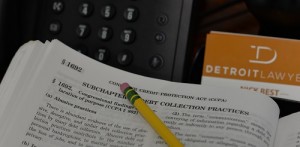How to Deal with Debt Collectors
Clients often contact our office when they are behind on their bills or their bills have been sent to collection. When a person is having trouble paying bills, a debt collector often comes calling. They will call you at home, work, on your cell phone, or even your parents. However, you do have rights! There are Michigan and Federal laws to protect consumers from unscrupulous creditors and debt collectors.
FDCPA and Michigan Law
 The Fair Debt Collection Practices Act (FDCPA) is a federal statute designed to protect consumers from abusive, deceptive, and unfair debt collectors. It provides consumers with a remedy against debt collectors who violate the law. Some common violations of the FDCPA are:
The Fair Debt Collection Practices Act (FDCPA) is a federal statute designed to protect consumers from abusive, deceptive, and unfair debt collectors. It provides consumers with a remedy against debt collectors who violate the law. Some common violations of the FDCPA are:
* Threatening to use violence
* Threatening arrest
* Using obscene language, insults or racial slurs in calls or on a voice-mail
* Calling before 8 AM or after 9 PM
* Calling the debtor at work, after requests have been made not to do so
* Contacting family members or friends and mentioning the debt
* Calling a person frequently or repeatedly
* Reporting false information on a consumer’s credit report
* Misrepresenting that he or she is an attorney or law enforcement officer
* Contacting consumer known to be represented by an attorney
* Threatning to ruin a debtor’s credit
* Contacting a consumer after your debts were discharged in bankruptcy
* Threats to contact your employer
The FDCPA gives consumers the ability to fight back against illegal debt collection practices. A debt collector who fails to comply with any provision of the FDCPA is liable for:
* Any actual damages sustained as a result of that failure
* Punitive damages of up to $1,000
* Costs and a reasonable attorney’s fee
Michigan has enacted its own consumer protection laws as well. Article 9 of the Occupation Code on debt collection deals with the business of debt collection. The Collection Practices Act deals with debt collection practices by people who are not debt collectors. Contrary to the FDCPA, the Michigan statutes afford relief for actions taken by creditors. For example, a bank attempting to collect a debt on a credit card it issued would not be included under the FDCPA. However, the Michigan Collection Practices Act would apply to this bank and other original creditors.
What To Do When A Debt Collector Calls
When a debt collector calls, they must advise you that the call is from a debt collector in an attempt to collect a debt. Keep track of any calls that have come in from debt collectors in a call log. Include the telephone number, person you spoke with and any relevant points of the conversation in the call log. Make sure to save all your voice messages. If you do have a case against a debt collector, the voice mails and call log may be helpful in proving illegal debt collection practices. To learn more about the Fair Debt Collection Practices Act you can head to the FTC’s website.
If creditors or debt collectors are harassing you, our consumer protection team may be able help you obtain a monetary settlement!
Contact our office today at 248.237.7979 to help end creditor harassment.
